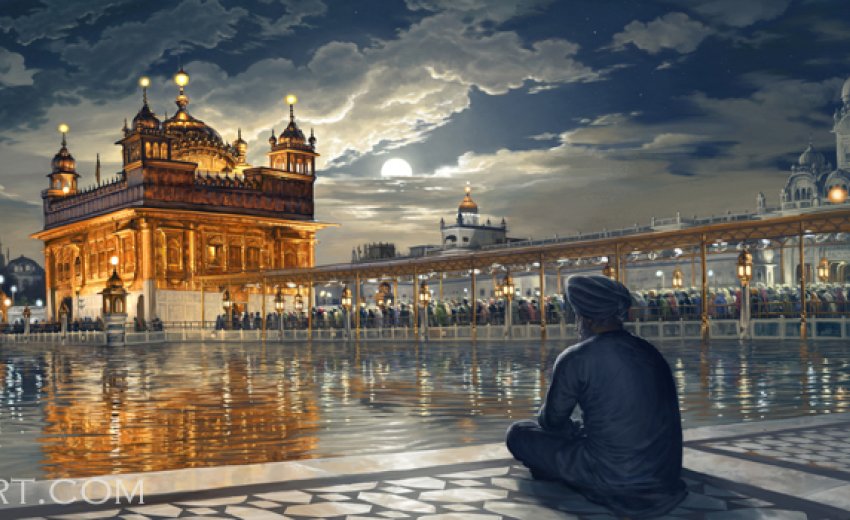
In my newest painting of Golden Temple - Meditations under the Moonlight, there's a Singh sitting peacefully in front of the radiant Harimandir Sahib.
The Singh is meditating on Waheguru and drinking Amrit.
What do you mean he is tasting Amrit? He is just sitting there.
What is Amrit?
In this article, I attempt to add some clarity to this ancient term known as Amrit. It is one of our Guru's favourite terms to describe a certain phenomenon.
Let's start from the beginning.
In Indian spiritual traditions, it is said that the churning of the world-ocean by opposing forces of duality, engaged in a perpetual tug-of-war, produces several key essences.
Amrit is one of these essences.

These spiritual stories that aim to teach the listener about meditation, often describe Amrit as the drink of the Gods, as Ambrosia. They describe obtaining Amrit through some method. They describe tasting Amrit. And they describe the effects of Amrit on the taster.
Apparently, after drinking Amrit you lived forever and ever. You became Chiranjeev, you became an immortal. There were even translators which translated Amrit as "nectar of immortality".
In Guru Granth Sahib, we listen to Guru Arjun Dev ji saying this exactly, that if you drink Amrit, you will live forever.
ਅੰਮ੍ਰਿਤੁ ਪੀਵਹੁ ਸਦਾ ਚਿਰੁ ਜੀਵਹੁ ਹਰਿ ਸਿਮਰਤ ਅਨਦ ਅਨੰਤਾ ॥
Drink Amrit and remain forever alive, the remembrance of Hari brings endless joy. - (496)
The sages said that after drinking Amrit you will not die. What they said was true but the understanding of what they meant was lost. They were trying to be as clear as possible, but it seems it has created confusion instead.
Listening to these stories and texts, people think Amrit is some kind of a drink, some kind of an intoxicating substance that gives you a high. Back when the Europeans were doing translations of Vedas and other spiritual texts, they thought Amrit was some kind of drink, some kind of psychoactive substance you were supposed to ingest.
What makes it even more difficult is that Amrit is said to grant immortality. It all becomes confusing to understand for those unfamiliar with what Amrit is and what it tastes like.
So what is Amrit, you ask? Amrit means A-Mrityu, non-death, not dying.
Amrit is that quality of consciousness that is timeless, that does not die (or change) with time, with different external circumstances.
When you meditate on Waheguru, then you enter into a trance state where the concept of time does not exist in your consciousness.
Waheguru is known as Akal Purush - Timeless Man. When you exist in this trance of timelessness, when you flow through life in such a state, then you become Timeless Man. This timeless aspect of man is known as Amrit, and it can be tasted via meditation.
There's a lot I want to say on this topic of Amrit but I am going to end this article with this.
Guru Sahibs do not say that we must have knowledge of Amrit. Guru Sahibs say that we must drink Amrit, that we must feel Amrit in our body, that we must experience it. This is because things you taste produce an immediate effect inside you. They produce an experience in your body, a certain state of being.
The experience of timelessness, the understanding it brings and the immediate effect it has on the body, is referred to as 'drinking Amrit'.






